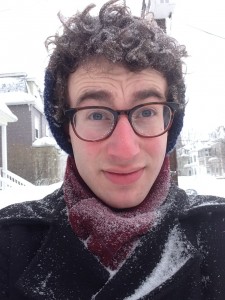This is a guest post by Michael Samuels (fiction 2015), who interviewed CW Program Director Karl Kirchwey for his take on the Creative Writing MFA.
For Karl Kirchwey, prize-winning poet, translator, and director of creative writing at BU, existential questions surround the school’s prestigious Master of Fine Arts in Creative Writing program. The top-ranked program, whose alumni include Jhumpa Lahiri, Ha Jin, Elizabeth Alexander, and Rafael Campo, is not for the faint of heart. “What are you in fact preparing your students to do?” he sometimes asks himself. “Well, you’re preparing them to starve, right? Especially if they’re poets!”
That’s a joke, mostly, although Kirchwey is humble with the promises of an MFA: there’s no guarantee that the degree will make you a great writer. “That’s a question of how you were born,” he says, “what’s happened to you that might make writing an urgent necessity for you, what might have happened to you that has unfit you for any other activity in life.”
“There are writers who manage to actually combine careers,” Kirchwey clarifies, citing the “physician poet” Rafael Campo as the prime example. Since few people make a living from writing fiction or poetry alone, most former students of the program become teachers in the US and abroad, local journalists and foreign correspondents, translators, editors, founders and coordinators of publications and literary organizations – careers enriched by a creative writing background, and with time carved out for their own fiction and poetry.
In any case, for those who believe they have the skill and devotion, “identifying your own gift and identifying your desire to focus on that gift is something which can be respected,” Kirchwey says, “and which can be built on.” The program offers “more time for your own work, more time for reading, more time for making connections with other writers, more time for learning how to teach,” he explains. The Global Fellowship, unique to the program, also provides more time to write, an adventure to write about, and sometimes the international connection that leads to a post-graduation job abroad.
Before traveling the world, Kirchwey says it’s also extremely valuable that students find their place in the cultural universe. “Just as scientific progress is completely impossible without an acceptance and an understanding of the work that has come before,” Kirchwey explains, “our progress as artists but also as human beings is completely impossible without an understanding of the literature, the art, the music that has come before.”
Writing, says Kirchwey, means joining that stream. “It is not to avoid responsibility, it is not to live as an irresponsible artist, but it is instead to take the highest kind of responsibility.”
Michael Samuels is a current Fiction MFA candidate, and writes for the Office of Communications at Boston University College of Arts & Sciences.
Thank you, Michael!
If you are a BU MFA student or alumnus and wish to write a post for this blog, please contact Catherine Con at crwr@bu.edu.

